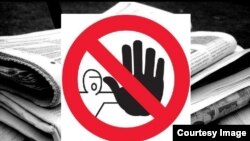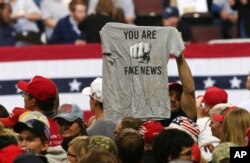A group of concerned citizens of the Muscogee (Creek) Nation in Oklahoma is circulating a petition that calls for a referendum on a recent tribal ruling to rescind press freedoms it guaranteed the tribe’s media outlet just three years ago.
In 2015, tribal members in the city of Okmulgee passed a law that established an independent media organization, Mvskoke Media (MM), and set up an independent editorial board to protect its print and broadcast entities from tribal government interference.
More than a week ago, the tribe's national council repealed the law in a hastily called emergency session and replaced it with a measure that not only abolishes the editorial board, but places the media outlet under the tribe’s executive branch. MM staff will now report to the tribe’s secretary of the nation and commerce.
Monte Randall, an MCN tribe member, drew up the petition, which reads, in part, “We do this with the best interest of our nation and for the future generations of MCN citizens to come.”
Once he has obtained 100 sponsor signatures, Randall said the group will turn in the application for certification by the Nation. Ultimately, they are hoping to put the matter to a vote of all tribal citizens.
“Without a free press as we move into an election year, we don't know what kind of information we would be missing out on,” he told VOA via Facebook.
In a statement released this past week, MCN principal chief James Floyd suggested the decision was motivated by funding concerns and promised to “continue to support the principles of free press.”
During the recent emergency vote, a council representative said Mvskoke Media covered too many “negative” stories.
Inspired by national rhetoric?
Sterling Cosper resigned his position as the tribe’s media manager shortly after the vote.
“I had inklings in my mind that we might have trouble,” he said. “The free press bill got passed three years ago in the middle of a tribal election which the incumbent ultimately lost. I think we were basically being used as a political weapon.”
The Native American Journalists Association (NAJA) was quick to criticize the new law.
“I can’t ascribe actual intent,” said NAJA President Tristan Ahtone, a member of the Kiowa Tribe in Oklahoma. “But I do think that we can probably say that those motivations don’t come from a very different place than other governments around the world that try to restrict press freedom.”
Ahtone cited comments from U.S. President Donald Trump labeling journalists as the "enemy of the people,” saying such rhetoric could have a domino effect nationally and internationally.
“As one group loses press freedoms, others will also,” he said.
State of the 'red press'
As part of its campaign to bolster protections for tribal journalists, NAJA this year launched what it calls the RED Press Initiative to survey the state of press freedom in Indian Country.
Ahtone estimates that about 200 tribes have media outlets and that about 75 percent of them operate under some form of free speech protection. Most, however, don’t have large numbers of subscribers, and because advertising revenues are small, those organizations must rely on tribal subsidies to keep afloat.
“Where it gets hazy is whether or not that tribal government is exerting influence over the content of those outlets or not,” he said. “In a survey we conducted earlier this year, journalists we talked to identified a lack of financial resources and a lack of editorial control as two of the greatest threats to tribal media.”
Because non-Native media outlets rarely report on tribal governments, Ahtone said Native outlets are the only means by which those citizens can get information that matters to their day-to-day lives.
NAJA has drawn up a list of elements it believes are essential to free and fair reporting in Indian Country. These include detailed written guarantees of protected speech, independent editorial boards which can act as a firewall between journalists and tribal governments, and tribal policies which include open public forums as well as access to tribal records.
As for Randall, he said he is certain that his efforts will bear fruit.
“We feel confident the Nation will hear our voice, and our free press will be returned,” he said.

